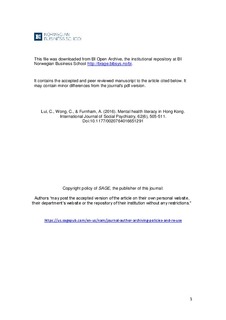Mental health literacy in Hong Kong
Journal article, Peer reviewed
Accepted version
Permanent lenke
http://hdl.handle.net/11250/2451055Utgivelsesdato
2016Metadata
Vis full innførselSamlinger
- Publikasjoner fra CRIStin - BI [1039]
- Scientific articles [2217]
Originalversjon
International Journal of Social Psychiatry. 2016, 62 (6), 505-511. 10.1177/0020764016651291Sammendrag
Abstract
Background and aims:
The aim of this study was to investigate Hong Kong nationals’ ability to recognize 13 different mental disorders and to examine whether there may be a relationship between their mental health literacy (MHL) and their tendency to describe/explain symptoms of mental disorders in physical terms.
Methods:
A total of 299 participants took part in this study and the vignettes depict post-traumatic stress disorder,depression, obsessive–compulsive disorder (OCD), dependent personality disorder, schizotypal personality disorder, generalized anxiety disorder, agoraphobia, bipolar disorder, social phobia, panic disorder, narcissistic personality disorder, schizophrenia and antisocial personality disorder.
Results:
Overall, OCD was the best identified and the personality disorders were the worst. A significant negative correlation was found between participants’ MHL and the rate of offering a ‘physical’ rather than a ‘psychological’ explanation. Some mental disorders were better recognized than others such as OCD (40.1%) and depression (36.3%). However, the majority of the other disorders were very poorly recognized and labelled with the rest having ‘correct response’ rates of lower than 15%. Over half of the mental disorders had ‘correct’ response rates of lower than 5%.
Conclusion:
In accordance with many other studies in the area, this study found Asian participants poor at recognizing mental disorders. This is probably due to the fact that mental illnesses of all kinds remain a taboo topic.
